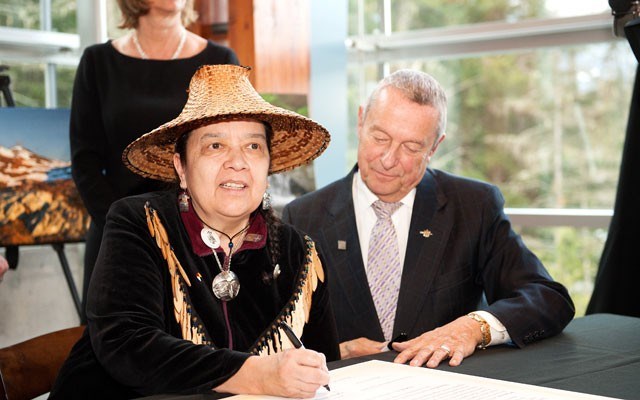There is a slight but perceptible shift underway. It is in its early stages, but it holds great promise if it is to continue to move forward.
Perhaps this is on our radar after the recent and historic announcement that the Squamish and Lil'wat nations have partnered with Whistler Blackcomb (WB) in a 60-year agreement to include economic development, revenue sharing and employment opportunities.
Some of this movement was palpable when Squamish Nation spokesman Chris Lewis said at the announcement that nation members are "no longer going to be invisible on their traditional territories... our connections to these lands are recognized."
Lil'wat Chief Dean Nelson said he and his members had always been hesitant with government. But he said attitudes have changed regarding agreements, acknowledgement and reconciliation. And the Lil'wat Nation decided it was time to stop saying no to agreements and proceed with an eye to the wellness of its people.
None of this transpired overnight. In fact, the WB agreement was eight years in the making: a seemingly slow-moving process that, we hope, garnered the best possible agreement for both First Nations.
And shortly after, the Squamish Lil'wat Cultural Centre (SLCC) received $242,000 from the federal government for its Aboriginal Youth Ambassador Program, which sets up 20 youth every 27 weeks to take part in training and cultural delivery that leads to job skills and work experience. Some students take the program, then return to train others.
The SLCC program is one step to help revive the culture that was first prohibited, then continually threatened in what was for decades termed "assimilation." After all, the last residential school in Canada closed in 1996 — the same year the Royal Commission on Aboriginal Peoples issued its final report that included recommendations to address the relationships between First Nations, non-First Nations and governments.
The irony is not lost: the same year that Vancouver showcased itself to the world for Expo '86, the United Church of Canada formally apologized to Canada's First Nations people. It was by no means an admission or acknowledgement from the Church concerning the physical and sexual abuse suffered by students at residential schools. But it was a step.
In the ensuing decades, the federal government negotiated compensation plans with the Anglican, Catholic, United and Presbyterian churches and agreed to pay 70 per cent of settlements to former residential-school students with validated claims. At the same time, the Supreme Court of Canada ruled that the federal government could not be held fully liable for damages suffered by students at some church-run schools.
It is what former Assembly of First Nations Chief Phil Fontaine called a 150-year "journey of tears, hardship and pain — but also of tremendous struggle and accomplishment." He made that statement 10 years ago.
It was only in 2008 — two years before Whistler stepped into the spotlight during the Winter Olympics — that the first formal apology by a Canadian Prime Minister was made. At about the same time, the Truth and Reconciliation Commission on residential schools suffered a staff implosion, and its rescue was helmed by Justice Murray Sinclair, who was appointed to restore the purpose and credibility of the commission.
The same year, the federal government did not renew funding for the Aboriginal Healing Foundation, a national network of community-based healing initiatives that served 134 programs. At times it is a few steps forward, and one step back.
This relationship is ongoing, changing, shifting and working toward resolutions for all, but most importantly for First Nations. In the Sea to Sky corridor, the seeds have been sown to generate these partnerships. Anecdotal comments from area politicians suggest a renewed mood, an increased willingness — if you will — and even an eagerness to build on this with all parties.
By no means is this to say we have arrived, that the work is done, or that we can congratulate ourselves for recent successes. Instead, it is the hope that the momentum of these steps can continue to propel us forward.
It was only a few years ago that Canada's then Gov.-Gen. Michaëlle Jean, when relaunching the Residential Schools Truth and Reconciliation Commission in 2009, said: "When the present does not recognize the wrongs of the past, the future takes its revenge."
They are words to live by as we step forward.




